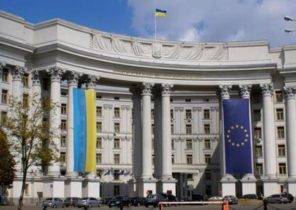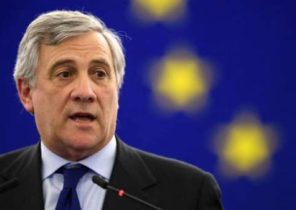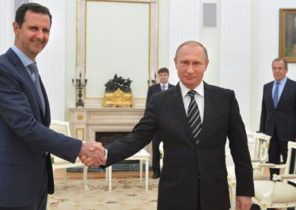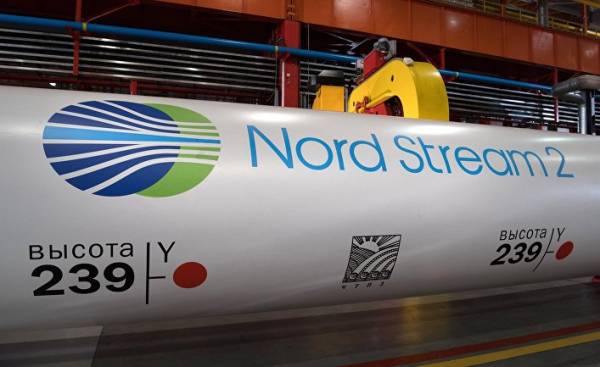
The process begins with the issuance of a permit to expand the “Nord stream”. But do we need all of Europe’s new pipeline through the Baltic sea? Eksplutatsionnie and Gazprom are confident, however, experts are still skeptical.
Someone who is serious about their civil rights, will have to spend a lot of time. He can flip through ten cases of extension of “Northern stream” and read six thousand pages. There he will find technical explanations, analyses about doing no harm to the environment, articles on the preservation of landscape, protection of animals and the sea.
Operating society of the Baltic pipeline seriously planned capacity expansion, and starting in Germany, the process of obtaining permission. On Tuesday after Easter the many departments and services in Mecklenburg — Western Pomerania will be presented for public review the documents at the time of filing. Parallel to the “Nord stream”, which operates under the leadership of Russian Gazprom, seeks to permit in Sweden, Denmark, Finland and Russia.
By the end of 2017, this permission must be obtained in Germany. By the mid 2018 will need to be settled all the formalities, and then start laying the pipeline in the water. At the end of 2019 must be received first gas. Then along with the existing two threads, through which the gas from Siberia is transported over 1.2 thousand kilometers in Greifswald, will be built two new ones.
Then the bandwidth will increase again to 55 billion cubic meters of gas per year and thus will double. On the gas pipeline “Nord stream — 2” will be possible to inject enough gas to provide the 26 million households in Western Europe.
In any case, Nord stream is sure to get permission. Ultimately it is primarily about the aspects related to environmental protection, and the new thread will largely take place along the first route is already enabled. “Our planning is based on wide experience and authoritative monitoring results that were collected during the first project “North stream”,” emphasizes Jens Lange (Jens Lange), who is responsible in operating the company for obtaining permits in Germany.
However, the bigger question is: does Europe need a new pipeline? Or Russia is just trying to circumvent transit through Eastern Europe? The project is controversial in both political and economic terms.
Therefore, Nord stream has instructed the firm’s “Forecast” dealing with economic research, to analyze which data are available to Handelsblatt. Summary: the European Union and Switzerland need additional gas imports, and it can be obtained through the “Nord stream — 2”.
In the industry recognize it is an undeniable fact that production of natural gas in Europe is declining. Already in the past years, its production in the North sea has decreased significantly. Until 2025 this production, according to the analysis company “Forecast” will be reduced compared to 2015 41 billion cubic meters. And the import requirements of the European Union and Switzerland, respectively, will increase by 2025 from 340 to 381 billion cubic meters billion cubic meters.
By 2020 will require an additional 20 billion cubic meters of gas. As Algeria and Norway will also be put less, will require the acquisition of additional quantities or liquefied natural gas (LNG) from the Middle East or gas from Russia. By 2020, the import from Russia or the purchase of LNG is expected to increase by 32 billion to 200 billion cubic meters, and in 2025 even by 76 billion to 244 billion cubic meters, says the analysis. Furthermore, the requirements can increase by another 16 billion cubic meters if Ukraine due to the ongoing tension in the relations with Russia will not be able to get gas directly from the neighbouring countries, and will get it in a roundabout way from the West — as the country has been doing lately.
“Forecast” does not make the conclusion that, in what proportion will be allocated between the import of LNG and Russian gas. At current prices of gas supplied by the pipeline will be much more favorable in price in comparison with expensive processes of srygivaniya and shipping by sea.
Laszlo Varro (Laszlo Varro), chief economist of the International energy Agency (IEA), in contrast, believes that “Nord stream — 2” is not needed. “The existing infrastructure that connects Europe with Russia, is quite sufficient to supply the required Russian gas to Europe,” said Varro in an interview with Handelsblatt. The expert a native of Hungary, before he was a Manager in the oil and gas group MOL in Budapest.
Risk factors in Europe
Varro sees the most important arguments in order to carry out the construction of “Nord stream — 2” as a key project for the energy security of Europe. “Europe needs to make a strategic decision: do we want to make further efforts for greater energy efficiency or to invest billions of euros in infrastructure for fossil fuels?”, the expert emphasizes on energy, not afraid to take a stand. “If the European States will implement measures which had been promised by their signature under the international climate agreement, then the import of gas from Russia will increase.”
According to the analysis “Forecast”, the import requirements of Europe and Switzerland will actually be less, if you reduce gas consumption. Import requirements can be reduced by greater use of renewable energy sources and greater energy efficiency. However, the “Outlook” gives more importance to this effect only in the period after 2025.
On the other hand, according to the market researchers, for Europe there are also risk factors. The largest of these is the current transit of Russian gas through Ukraine. If the negotiations between Russia and Ukraine on a new agreement on transit will fail, Europe will be forced to get gas on other routes.
The question becomes political. Critics of Nord stream have seen the new pipeline is an obvious attempt by Russia to circumvent Ukraine. “The share of Russian gas in the market has reached its highest level,” makes you wonder expert IEA Varro. Despite political differences between the European Union and Russia over the past two years, Gazprom has never exported to Europe as much gas as now. “There is complete contradiction between European foreign policy and the export of Russian gas,” says Varro.
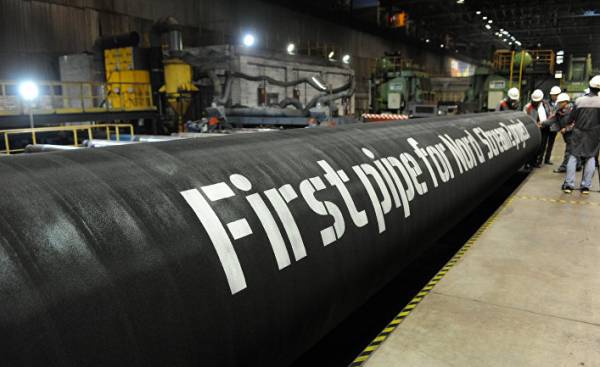 © REUTERS, Nord Stream 2/Handout via REUTERSТрубы for the project “Nord stream — 2” the plant of OMK in Vyksa
© REUTERS, Nord Stream 2/Handout via REUTERSТрубы for the project “Nord stream — 2” the plant of OMK in Vyksa
Supporters of the “Nord stream — 2”, on the contrary, justify the construction of a new pipeline this tension: Europe in its own interests should seek a reliable route. “We Europeans should consider our own interests — say, for example, the head of Wintershall Mario Mehren (Mario Mehren), — good for us, when gas is supplied to us via different routes, then we will not have problems, if a pipeline will fail”.
And the head of the Austrian company OMV Rainer Seele (Rainer Seele) warns against “politicizing economic project for improving the security of supply of Europe.” “We Europeans need to diversify routes of Russian gas imports. Gazprom helped us in late winter with additional supply, stresses Seele. Every new pipeline increases the liquidity of the gas market in Europe and potentially reduce prices through increased supply.”
But not only Ukraine fears that it will bypass Russia. Those concerned, and Poland, through which passes the second line with Russian gas. Poland adjusts the European Union against a new project and have already achieved last year’s partial success. She blocked the consortium, in which Gazprom wanted to tie European partners to the “Nord stream — 2”: Uniper and Wintershall of Germany, OMV of Austria, the Engie from France and the British-Dutch group Shell. The consortium was disbanded due to resistance of the Antimonopoly inspection in Poland.
However, Nord stream and Gazprom is not stopped, and now they are promoting the project themselves. They have already ordered the pipes and made use of ships required for laying pipes. Although Poland in the framework of the international consultations on transboundary impact on the environment and can Express their doubts about authorization, however, formal permission from Poland Nord stream is not needed.
In parallel, Gazprom continues to work to attract foreign partners to participate in another design of the funding for this billion dollar project. “A European consortium in 2017 will make the final decision on the “Nord stream — 2″,” — said the head of OMV Seele.

